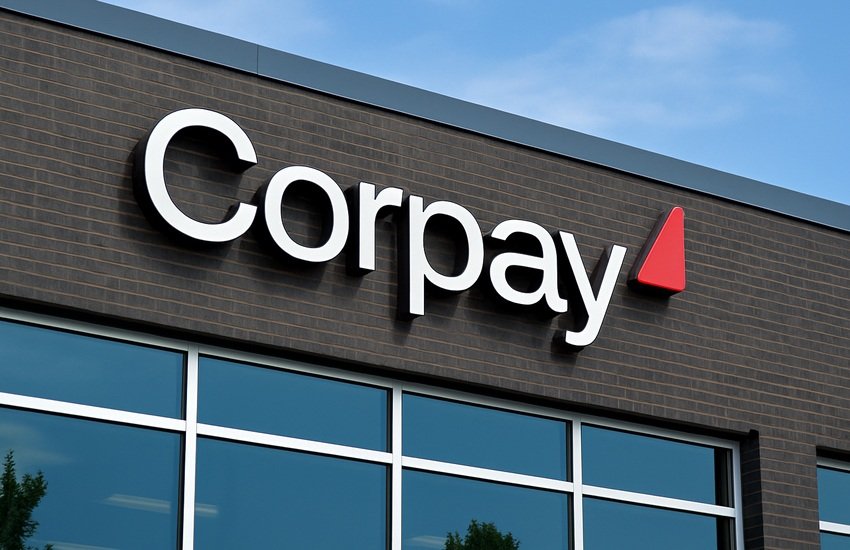Support 100% Independent Research With Our 7-Day Free Trial
Corpay (NYSE:CPAY) has made headlines with its definitive agreement to acquire Alpha Group International in an all-cash deal valued at approximately $2.2 billion (£1.6 billion). The transaction, offering Alpha shareholders £42.50 per share—a 55% premium over its undisturbed price as of May 1, 2025—is expected to close in Q4 2025, pending shareholder and regulatory approvals. This acquisition comes on the heels of a busy strategic year for Corpay, including a $300 million cross-border partnership with Mastercard and a minority investment in AvidXchange. Alpha Group, a specialist in cross-border FX and alternative bank account solutions for European investment managers, brings with it around $3 billion in deposits across 7,000 client accounts. Corpay’s management views this acquisition as complementary to its rapidly growing corporate payments business. CEO Ron Clarke highlighted the deal’s potential for global expansion, diversified revenue, and earnings accretion by 2026. But what synergies does this deal really unlock?
Expanding Global Cross-Border Capabilities With Minimal Redundancy
Corpay’s cross-border payments segment has already demonstrated strong momentum, with Q1 2025 organic revenue growth of 18% and sales up 51% year-over-year. By acquiring Alpha Group, Corpay significantly deepens its reach into the European institutional client base—specifically alternative investment managers who rely on Alpha’s virtual IBAN and bank account infrastructure to manage capital across borders. Alpha’s client roster of more than 7,000 accounts and $3 billion in deposits provides Corpay immediate volume and credibility in a geography where it has thus far been underpenetrated. Moreover, Alpha’s capabilities complement Corpay’s own infrastructure without significant overlap. While Corpay is scaling its multi-currency and FX risk management offerings through recent investments and the Mastercard partnership, Alpha already has robust tech stacks and regulatory licenses in key European jurisdictions. This means Corpay can bypass the time-consuming and capital-intensive task of building its own European bank account solutions from scratch. It also allows for an accelerated go-to-market approach in institutional B2B financial services, where trust and local presence are essential. The acquisition gives Corpay the opportunity to unify its cross-border solutions under a single global framework, allowing it to offer end-to-end services to multinational investment firms, private equity groups, and corporate treasuries. By absorbing Alpha’s platform and customer relationships, Corpay positions itself for wider adoption in FX and payments, not just in the U.K. and EU but also in the U.S. and Asia, where Alpha’s models could be ported with Corpay’s scale. This potential to achieve global payment orchestration with minimal duplication of efforts makes the acquisition strategically compelling.
Unlocking Multi-Year Cross-Sell & Revenue Synergies In Investment Manager Verticals
One of the core rationales behind the Alpha Group acquisition lies in the revenue synergy potential, especially within investment management firms. Alpha is a known provider of virtual bank accounts and FX services tailored specifically for European investment managers—an audience Corpay has only recently started targeting via its institutional client strategy. Corpay is currently expanding its institutional offerings with a multi-currency product and has already onboarded over 2,000 institutional clients with $800 million in deposits. Alpha’s acquisition allows Corpay to immediately scale this segment and offer cross-sell opportunities across both companies’ product lines. For instance, Corpay’s risk management tools and ACH+ solutions can be offered to Alpha’s client base, while Alpha’s alternative account structures and hedging services can be integrated into Corpay’s offerings for U.S.-based asset managers. The potential for bundling payments, treasury management, and FX solutions under one umbrella provides sticky revenue streams and strengthens client relationships. With over 1.4 million vendors already in Corpay’s proprietary network, Alpha’s customers stand to benefit from expanded payment rails and potentially lower costs. Likewise, Corpay can monetize the transaction flow more effectively across Alpha’s customer base through its established MasterCard and ACH-based infrastructures. Furthermore, with regulatory uncertainty in the EU post-Brexit and upcoming MiFID revisions, having a unified cross-border service provider that offers regulatory clarity and service continuity could be a strong selling point for both existing and new clients. Over time, this vertical integration and alignment across adjacent financial service needs could contribute to higher customer lifetime value, lower churn, and reduced client acquisition cost for Corpay.
Strengthening EPS Visibility & Margin Expansion Via Operational Integration
From a financial standpoint, Corpay’s management has been explicit about the expected EPS accretion in 2026 following the Alpha Group acquisition. This is not surprising given Corpay’s track record of acquiring underperforming or niche players and improving margin profiles within 6 to 12 months. The company’s adjusted EBITDA margins have consistently stayed around 55%, thanks to strict cost discipline and a centralized technology architecture. Alpha, on the other hand, operates with significantly lower margins due to standalone infrastructure and regional regulatory compliance overheads. Post-acquisition, Corpay can streamline Alpha’s cost structure by migrating client operations onto its unified tech stack, eliminating redundancies in customer service, compliance, and data management. Given that most of Alpha’s client interface is digital, the integration timeline for backend systems is expected to be shorter than that of more complex acquisitions. Furthermore, Alpha’s revenue mix—concentrated around transactional FX services and virtual accounts—offers ample room for product expansion, including card monetization, expense management, and cross-border payroll capabilities. These are high-margin services already offered by Corpay. By standardizing these offerings across both companies’ customer bases, Corpay could lift Alpha’s contribution margin while maintaining the group’s target EBITDA profile. In addition, the consolidation of Alpha’s banking relationships into Corpay’s broader treasury operations may enable better capital efficiency, particularly in deposit management and foreign exchange exposure. Combined with existing operational leverage, this acquisition aligns with Corpay’s stated goal of maintaining low capital intensity while growing earnings and free cash flow.
Gaining A Strategic Foothold In A Fragmented European FX & Payments Market
Alpha Group’s acquisition also serves as a beachhead into a fragmented and competitive European B2B payments ecosystem. Unlike the U.S., where Corpay has a strong brand presence and established partnerships, Europe remains a complex market governed by diverse financial regulations, varying client needs, and a multitude of fintech players. By acquiring Alpha, Corpay bypasses the arduous task of regional expansion and client acquisition in the U.K. and EU markets. Alpha already possesses the required licenses and banking relationships across Europe, providing Corpay with instant regulatory compliance and operational readiness. Moreover, Alpha’s specialization in serving mid-market investment managers—a group often overlooked by large banks and underserved by legacy providers—opens up a relatively insulated market segment with significant stickiness. This acquisition also gives Corpay a differentiated positioning compared to competitors like Wise, Airwallex, or Currencycloud, which primarily focus on SMEs and lack Alpha’s deep integration into institutional workflows. As Corpay pushes into this market with Mastercard’s endorsement and a maturing cross-border tech stack, it could also become an attractive partner for Tier 2 and Tier 3 banks looking to white-label FX and payment services. In this way, Alpha becomes more than just a client portfolio—it becomes a strategic wedge for Corpay to scale horizontally in Europe and eventually vertically into broader financial infrastructure partnerships. However, success here depends on seamless integration and alignment of go-to-market strategy, which will require careful execution.
Key Takeaways
Corpay’s planned acquisition of Alpha Group presents both strategic advantages and operational challenges. On the upside, the deal offers strong synergy potential across cross-border payments, regulatory access, and the institutional investment manager segment—bolstering Corpay’s long-term expansion into Europe and beyond. It provides a fast-track entry into a high-growth, low-overlap vertical while strengthening its revenue diversity and EPS visibility. However, the deal also introduces potential execution risks, particularly in integrating Alpha’s operations and retaining key clients during the transition. The cross-border regulatory environment remains fluid, and any delay or misalignment could affect synergy realization timelines. Furthermore, the premium paid suggests high expectations for performance improvements and cost rationalization—an outcome not guaranteed in volatile macroeconomic conditions. Overall, while Corpay’s move to acquire Alpha aligns with its broader strategic roadmap, its success will ultimately depend on disciplined integration and the company’s ability to unlock Alpha’s latent value without disrupting its growth momentum.






